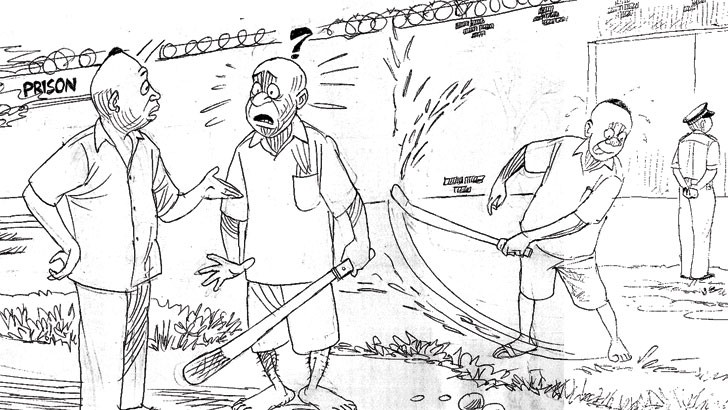Frogs desiring a king
The frogs were living as happy as could be in a marshy swamp that just suited them.
They went splashing about caring for nobody and nobody troubling with them.
But some of them thought that this was not right; that they should have a king and a proper constitution, so they determined to send up a petition to mphambe to give them what they wanted.
Perceiving their simplicity, mphambe cast down a huge log into the lake.
The frogs were terrified at the splash occasioned by its fall and hid themselves in the depths of the pool.
But as soon as they realised that the huge log was motionless, they swam again to the top of the water, dismissed their fears, climbed up and began squatting on it in contempt.
After some time, they began to think themselves ill-treated in the appointment of so inert a ruler, and sent a second deputation to mphambe to pray that he would set over them another sovereign.
He then gave them an eel to govern them. When the frogs discovered its easy good nature, they sent yet a third time to mphambe to beg him to choose for them still another king.
Mphambe, displeased with all their complaints, sent a heron, who preyed upon the frogs day by day until there were none left to croak upon the lake.
Then the frogs repented when too late.
And Malawians are in the same situation.
Most individuals do not need sophisticated measurement tools to tell the difference between good leaders and bad leaders.
They feel the difference.
They experience the effects at a very personal level like the frogs did.
In general, good leaders are more effective than bad leaders in almost every dimension
Not to belabour the point, President Peter Mutharika and Democratic Progressive Party (DPP) have no clue on how to run a government.
One important cornerstone of a functioning democracy is that government must offer interventions that provide practical proposals on how best to ensure that, for example, Malawi is sustainably food-secure and has a running health system, that the youth are skilled and find employment, and that a culture of hard work, self-reliant, honest and discipline replaces that of growing culture of abuse of public resources, begging and dependency.
Public power that Mutharika and DPP have is conferred on trust by the citizenry and that it must be exercised solely to protect and promote the interests of the citizenry.
The unprecedented levels of food insecurity, unemployment and poor health delivery, and the collapse of the values of hard work, honest and discipline in the country ought to concern at best the President and every well-meaning Malawian.
But instead of finding long-term solutions to the problems rocking the country’s health sector, the DPP government all can think about is to conceal their inefficiency and direct, through the Ministry of Agriculture, Irrigation and Water Development, water boards not to disconnect water from public hospitals for non-payment of bills unless the minister approves then action.
The directive comes against the background of reduced funding to the health sector that has seen some district hospitals getting half their monthly allocations, a situation that has seen some facilities suspending provision of food to patients and ambulance services among others.
Frankly, the President vastly appears to fall short of authentic commitment to deliver Malawi from the recurring socioeconomic evil, which he is of late continually and shamelessly disassociating himself and his party from.
But Malawians on May 20 2014 queued to elect a kind of leadership that would engineer the sort of social, economic and political transformation the country so desires. Otherwise, the country has been treated like the frogs. n




